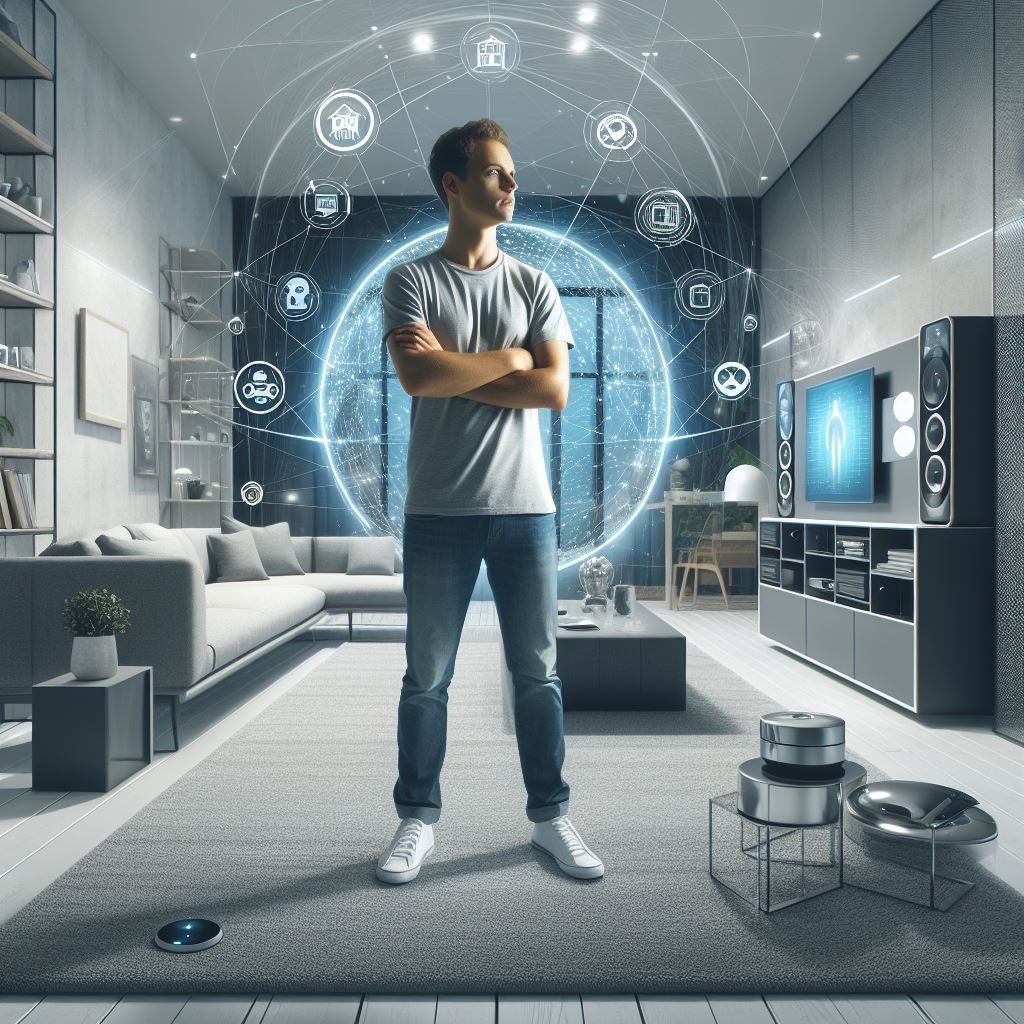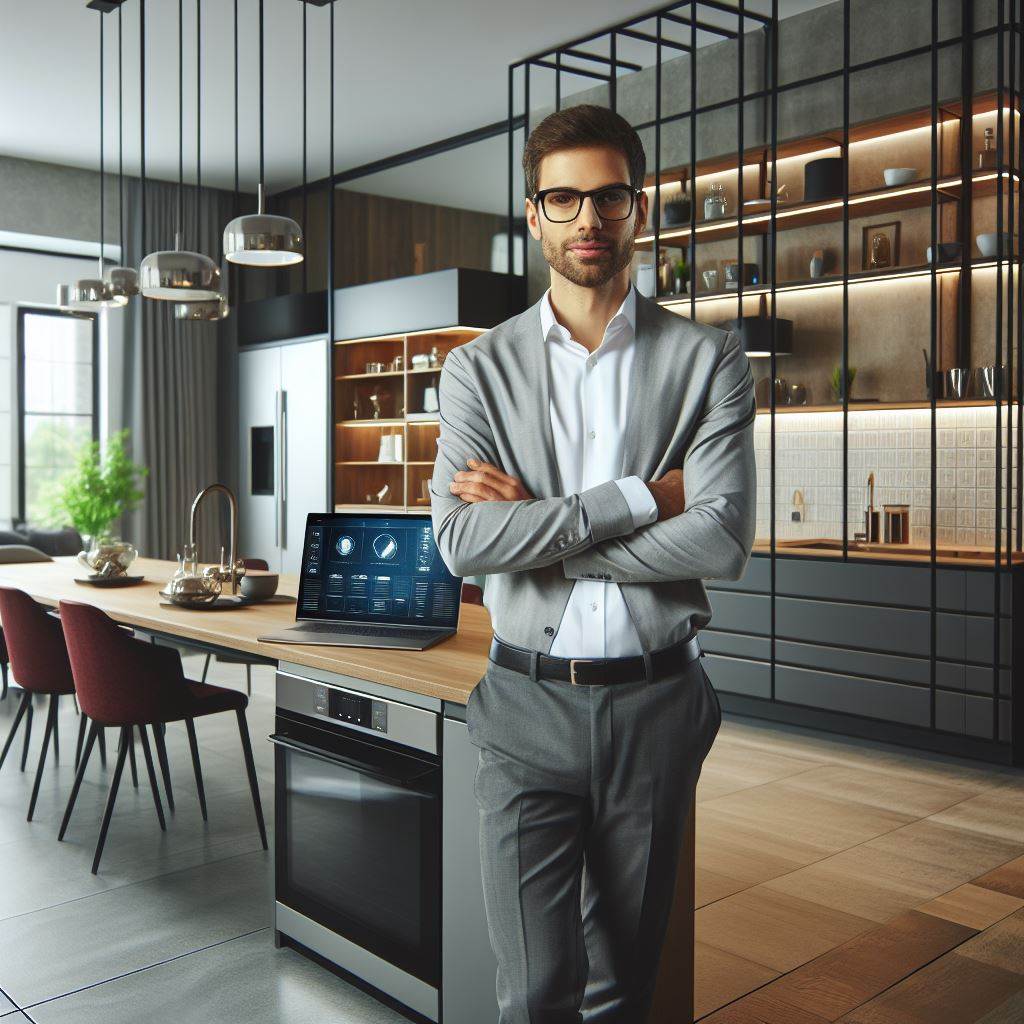Introduction
Home automation refers to the integration of technology and electrical appliances in a residential setting to enhance convenience and comfort.
It involves the control and automation of lighting, heating, ventilation, air conditioning, security systems, and other devices.
Home automation systems have gained significant momentum in the real estate industry for their ability to improve lifestyle, energy efficiency, and security within homes.
Home automation is the implementation of smart systems and devices that allow homeowners to control and monitor various functions in their homes remotely.
These functions include lighting, temperature, security, and entertainment systems. It aims to simplify daily tasks and provide an enhanced living experience for residents
Home automation has become increasingly significant in the real estate industry due to its potential to attract and satisfy the modern homebuyer.
With the rising demand for convenience and technological advancements, home automation has emerged as a key selling point for developers and real estate agents.
It offers a futuristic and luxurious lifestyle, making properties more desirable and competitive in the market.
Moreover, home automation contributes to energy efficiency and cost savings.
Current state of home automation in real estate
In the rapidly evolving landscape of real estate, one trend is gaining significant traction: home automation.
As technology continues to infiltrate every aspect of our lives, it’s reshaping the way we interact with our living spaces.
From smart thermostats to voice-activated assistants, the current state of home automation offers a glimpse into the future of real estate.
Overview of current technologies and devices available
At present, home automation encompasses a wide array of technologies and devices designed to enhance convenience, efficiency, and security within homes.
Smart thermostats like Nest and ecobee allow homeowners to remotely control temperature settings, optimizing energy usage and reducing utility costs.
Meanwhile, smart locks and security cameras offer peace of mind by providing remote monitoring and access control.
Statistics on adoption rates and market growth
Statistics reflect the growing popularity of home automation.
According to recent studies, the global smart home market is projected to reach over $100 billion by 2026, with an annual growth rate exceeding 20%.
Moreover, adoption rates are steadily increasing, driven by factors such as affordability, ease of installation, and a desire for greater connectivity.
Benefits for homeowners and buyers
The benefits of home automation for homeowners and buyers are manifold.
Beyond the convenience of remotely managing household systems, automation can lead to significant cost savings through energy efficiency and reduced insurance premiums.
Enhanced security features provide added protection against intruders, while integrated smart devices can simplify daily routines and improve overall quality of life.
For homeowners looking to sell, integrating home automation technologies can boost property value and attract tech-savvy buyers.
Real estate listings featuring smart home amenities often command higher selling prices and shorter time on the market.
Additionally, homes equipped with automation systems appeal to a broader range of potential buyers, including young professionals, families, and retirees seeking modern amenities.
In fact, home automation represents the future of real estate, offering a glimpse into a more connected and efficient way of living.
With an expanding array of technologies and increasing adoption rates, the integration of automation systems is poised to become standard practice in homes around the world.
Whether you’re a homeowner looking to upgrade your living space or a prospective buyer seeking modern amenities, the era of smart homes is here to stay.
Read: Revolutionizing Price Predictions with ML Tech
Potential impact of home automation on the real estate market
In an age where technology continues to revolutionize every aspect of our lives, home automation emerges as a transformative force in the real estate market.
With its seamless integration of smart devices and systems, home automation isn’t just about convenience; it’s reshaping the very landscape of real estate, offering unparalleled benefits to homeowners and investors alike.
Improved property value and desirability
The potential impact of home automation on the real estate market is profound.
By incorporating smart technology into properties, homeowners can significantly enhance their property’s value and desirability.
From automated lighting and thermostats to security systems and virtual assistants, these features not only add a layer of sophistication but also appeal to modern buyers who prioritize convenience and efficiency.
Increased efficiency and convenience for homeowners
Moreover, home automation fosters increased efficiency and convenience for homeowners.
Imagine being able to control your home’s temperature, lighting, and security with just a few taps on your smartphone or a voice command.
This level of control not only simplifies daily tasks but also contributes to a more comfortable and secure living environment.
Integration with smart neighborhoods and communities
The integration of home automation with smart neighborhoods and communities further amplifies its impact.
By connecting homes to a centralized network, residents can enjoy shared amenities and services, such as energy management systems, community-wide security protocols, and even autonomous transportation options.
This interconnectedness not only promotes sustainability but also fosters a sense of community and collaboration among residents.
Attracting tech-savvy buyers and renters
Furthermore, home automation has the potential to attract tech-savvy buyers and renters.
As technology becomes increasingly intertwined with our lives, individuals are seeking residences that cater to their digital lifestyle.
Properties equipped with advanced automation features stand out in the market, appealing to a demographic that values innovation and connectivity.
In short, home automation represents the future of real estate. Its ability to improve property value, enhance convenience, integrate with smart communities, and attract tech-savvy buyers positions it as a game-changer in the industry.
As the demand for connected living spaces continues to rise, embracing home automation is not just a trend but a strategic investment in the evolution of real estate.
Read: Smart Security Systems: Safer Homes, Higher Value

Challenges and Barriers to Widespread Adoption
Although home automation holds great promise for the future of real estate, there are several challenges and barriers that need to be addressed for its widespread adoption:
Cost Considerations for Installation and Maintenance
One of the main challenges in adopting home automation is the cost associated with installation and maintenance.
Smart home devices and systems can be quite expensive, making it a significant investment for homeowners.
Furthermore, the ongoing maintenance costs can also add up over time.
However, as technology advances and becomes more accessible, the costs are expected to decrease, making home automation more affordable and appealing to a wider range of homeowners.
Technical Complexity and Compatibility Issues
Another significant barrier to widespread adoption is the technical complexity involved in setting up and managing home automation systems.
Many homeowners may not have the technical expertise or knowledge required to install and configure these systems themselves.
Additionally, compatibility issues can arise when trying to integrate different devices and platforms from different manufacturers.
This can lead to frustration and confusion for users, discouraging them from fully embracing home automation.
Data Privacy and Security Concerns
As more aspects of our lives become digital and connected, data privacy and security concerns are growing.
Home automation systems collect and process sensitive information about homeowners, such as their daily routines and preferences.
There is a fear that this data could be accessed or exploited by hackers, leading to privacy breaches or even compromising the physical security of homes.
Addressing these concerns and implementing robust security measures will be crucial for widespread adoption of home automation.
Resistance from Traditional Homeowners and Buyers
Lastly, there is resistance from traditional homeowners and buyers who may be skeptical or hesitant to embrace the idea of home automation.
Some may prefer the familiarity and simplicity of traditional manual controls, while others may be concerned about the potential for technology failures or malfunctions.
Overcoming this resistance will require education and awareness campaigns, highlighting the benefits and conveniences that home automation can offer.
As more people experience the advantages firsthand, the resistance is likely to diminish.
While home automation has the potential to revolutionize the real estate industry, there are several challenges and barriers that need to be addressed for its widespread adoption.
These include cost considerations, technical complexity, data privacy and security concerns, as well as resistance from traditional homeowners and buyers.
However, as technology continues to evolve and become more affordable, and as awareness and understanding of the benefits of home automation grow, these challenges can be overcome.
With proper solutions in place, the future of real estate may very well be intertwined with home automation.
Read: Smart Thermostats: Boosting Home Value & Comfort
Industry response and future trends
In recent years, home automation has emerged as a transformative force in the real estate industry, reshaping the way we live and interact with our living spaces.
From smart thermostats and lighting systems to integrated security cameras and voice-activated assistants, the possibilities seem boundless.
But what does the future hold for this burgeoning technology within the realm of real estate? Let’s delve into the industry response and future trends.
Real estate developers and technology firms are increasingly recognizing the potential of home automation to enhance the value and appeal of properties.
Collaborations between these stakeholders have become commonplace, with developers integrating smart home features into new constructions and renovations.
This symbiotic relationship fosters innovation, driving the evolution of home automation systems to meet the ever-changing needs and preferences of homeowners.
Collaboration between real estate developers and technology firms
The collaboration between real estate developers and technology firms is key to unlocking the full potential of home automation.
By working together, they can develop solutions that seamlessly integrate with existing infrastructure, ensuring ease of installation and operation for homeowners.
This partnership also facilitates the creation of customizable smart home packages, catering to a diverse range of preferences and budgets.
Development of standardized protocols and interoperability
As the home automation market continues to expand, the need for standardized protocols and interoperability becomes increasingly apparent.
Industry stakeholders are actively working towards establishing common standards to ensure compatibility between different devices and systems.
This interoperability not only simplifies the user experience but also fosters innovation and competition within the market.
Growing interest from investors and venture capitalists
The rapid growth of the home automation market has captured the attention of investors and venture capitalists, who see immense potential in this burgeoning industry.
With a growing number of startups and technology firms entering the market, investment opportunities abound.
This influx of capital fuels further innovation and drives down costs, making home automation more accessible to a wider audience.
Predictions for the future of home automation in real estate
Looking ahead, the future of home automation in real estate appears bright.
As technology continues to advance and consumer demand grows, we can expect to see even more sophisticated and integrated solutions entering the market.
From AI-powered virtual assistants to predictive maintenance systems, the possibilities are endless.
Ultimately, home automation is poised to become not just a luxury but a standard feature in the homes of tomorrow, revolutionizing the real estate industry in the process.
Therefore, home automation represents the future of real estate, offering unparalleled convenience, security, and efficiency for homeowners.
By fostering collaboration, standardization, and innovation, industry stakeholders can unlock the full potential of this transformative technology, shaping the way we live for years to come.
Read: Future of Real Estate: Predictions on Blockchain
Conclusion
Home automation holds tremendous potential in revolutionizing the real estate industry.
With its ability to enhance convenience, security, energy efficiency, and overall home management, it is clear that home automation is the future of real estate.
Industry professionals should embrace this technology to stay ahead of the competition and meet the growing demands of tech-savvy homebuyers.
By integrating automation systems into homes, professionals can create smart homes that offer a seamless and comfortable living experience.
While there may be challenges in terms of costs and privacy concerns, the benefits far outweigh the drawbacks.
As technology continues to advance and become more affordable, we can expect rapid adoption of home automation in real estate.
Ultimately, home automation has the potential to redefine the way we live, work, and interact with our living spaces.
It opens up a myriad of possibilities for creating personalized and intuitive homes that cater to individual preferences and needs.
Investing in home automation now is a forward-thinking approach that will attract homebuyers and increase property value in the future.
So let’s embrace the future and leverage the power of home automation to shape the real estate landscape.
The time to integrate smart technology into homes is now, and the possibilities are endless.
Together, we can create a future where every home is smart, efficient, and truly connected.




